Whether you’re a seasoned blogger looking to switch platforms or a beginner eager to start your own blog, choosing the right blogging platform can be challenging.
In this article, we will explore the 13 best blogging platforms that will help you kickstart your blog.
- There are many blogging platforms that will allow you to kickstart your blog quickly and effortlessly
- Beginners often opt for some free and intuitive blog builders such as Wix or Google Blogger platforms
- When choosing the ideal blogging platforms you should consider options like purpose, pricing, customization, monetization opportunity, and others
Best Free Blogging Platforms
If you’re restricted on budget and are looking for free ways to break into blogging, here is a list of the best free blogging platforms you can consider.
Wix Blogging Platform
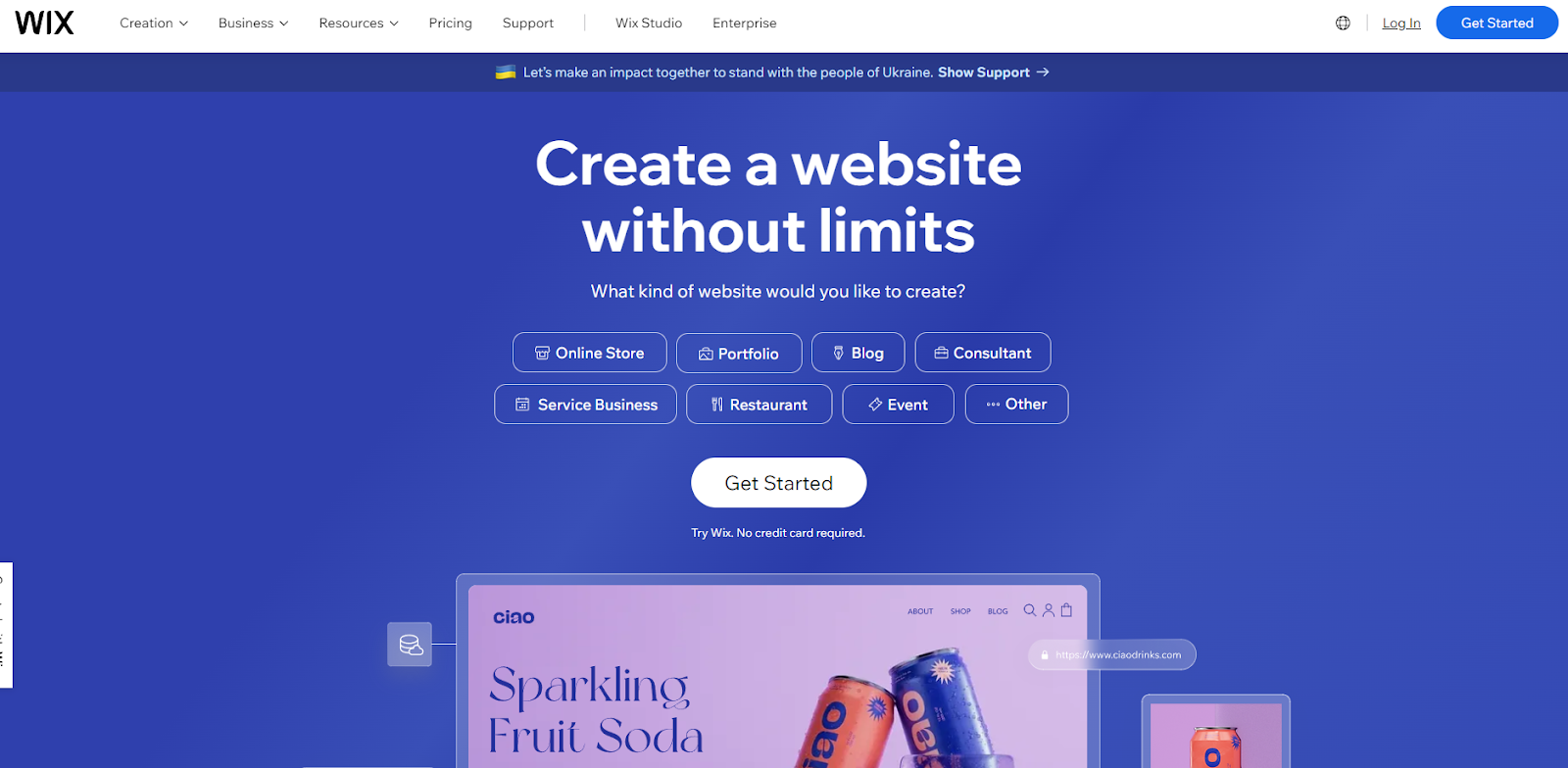
Wix is a popular website builder that offers a user-friendly blogging platform as one of its key features. It’s known for its intuitive drag-and-drop editor, making it easy for beginners to create and customize their blogs.
With Wix, you have access to a wide range of templates, design elements, and apps to enhance your blog’s functionality.
- Intuitive and user-friendly interface
- Wide selection of templates
- Easy app integration
- Multimedia support
- Limited SEO control
- Less scalable compared to other CMS platforms
Pricing
Wix is a free platform, but it offers premium plans with more features. The pricing starts from $4.50 to $34/month.
Best for:
- Great for beginners
- Personal use
- Small businesses
- Portfolios
Learn more in our comprehensive Wix review
Drupal Blogging Platform
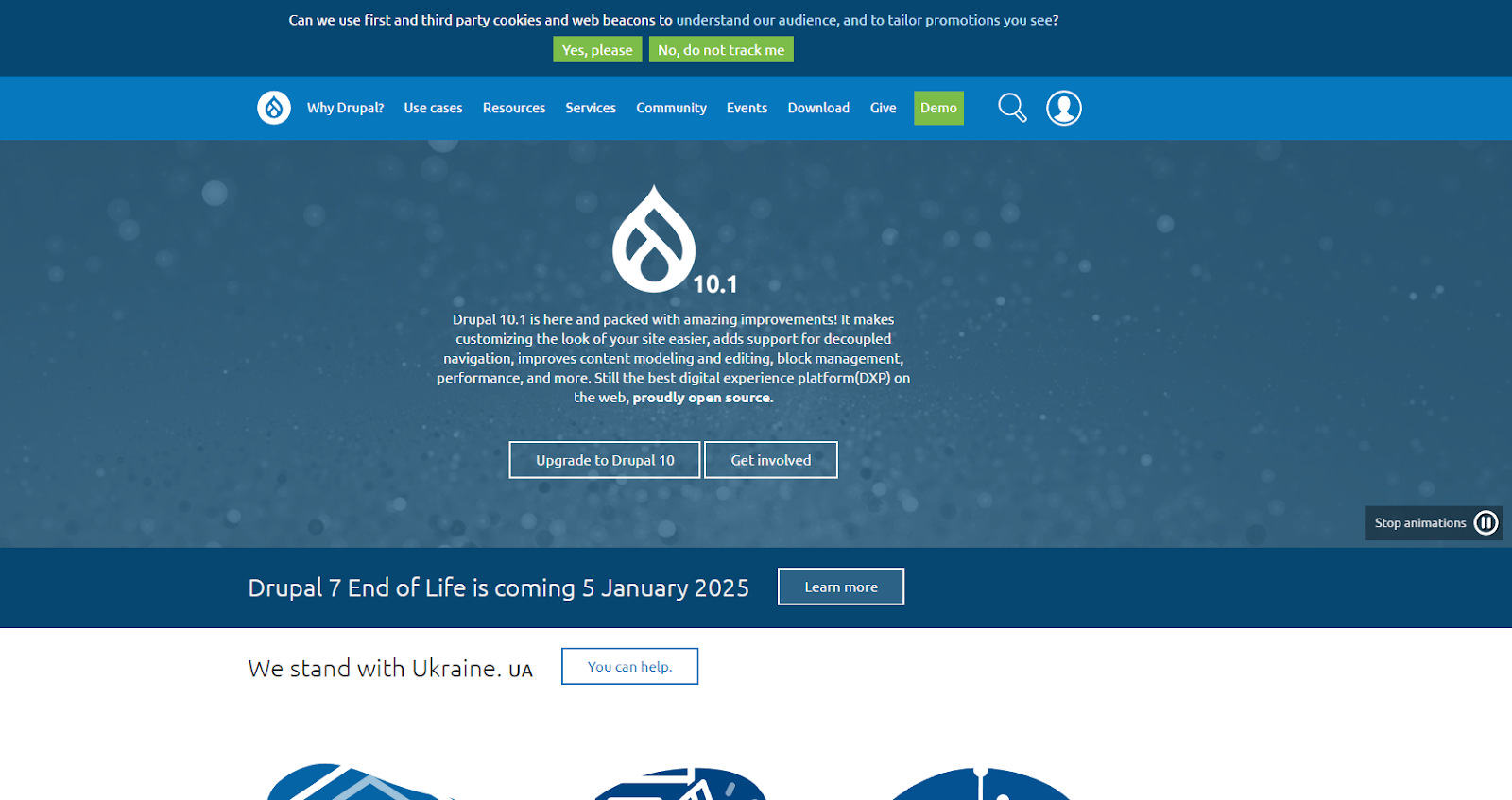
Drupal is a powerful open-source content management system (CMS) that offers robust blogging capabilities. It’s known for its flexibility, scalability, and extensive community support.
Drupal provides a highly customizable platform for bloggers who want complete control over their websites. With a wealth of themes, modules, and extensions, you can tailor your blog to meet your specific needs. It’s particularly well-suited for bloggers who have technical expertise and seek advanced functionality.
- It’s highly customizable
- It’s scalable
- It has a large developer community
- Strong security features
- Multilingual support
- It has a steep learning curve
- It may demand more server resources
Pricing
Drupal is open-source and free to use. However, costs may arise from web hosting, premium themes, and custom development, depending on your specific needs.
Best for
- Best suited for experienced bloggers
- Software developers
- Organizations looking for a secure and scalable platform
Learn more about Drupal:
- The Best Drupal Hosting Providers
- How To Create Articles and Pages in Drupal
- How to Create a Landing Page for Drupal 8 Using Display Suite
- How to Create Multi-Language Pages for Drupal?
- How to Install Drupal using cPanel
- How to Upgrade a Drupal 7 Site to Drupal 8
- How to Manage Social Media Thumbnails in Drupal 8?
- How to Add Crop to Image Uploads in Drupal 8
Craft CMS Blogging Platform
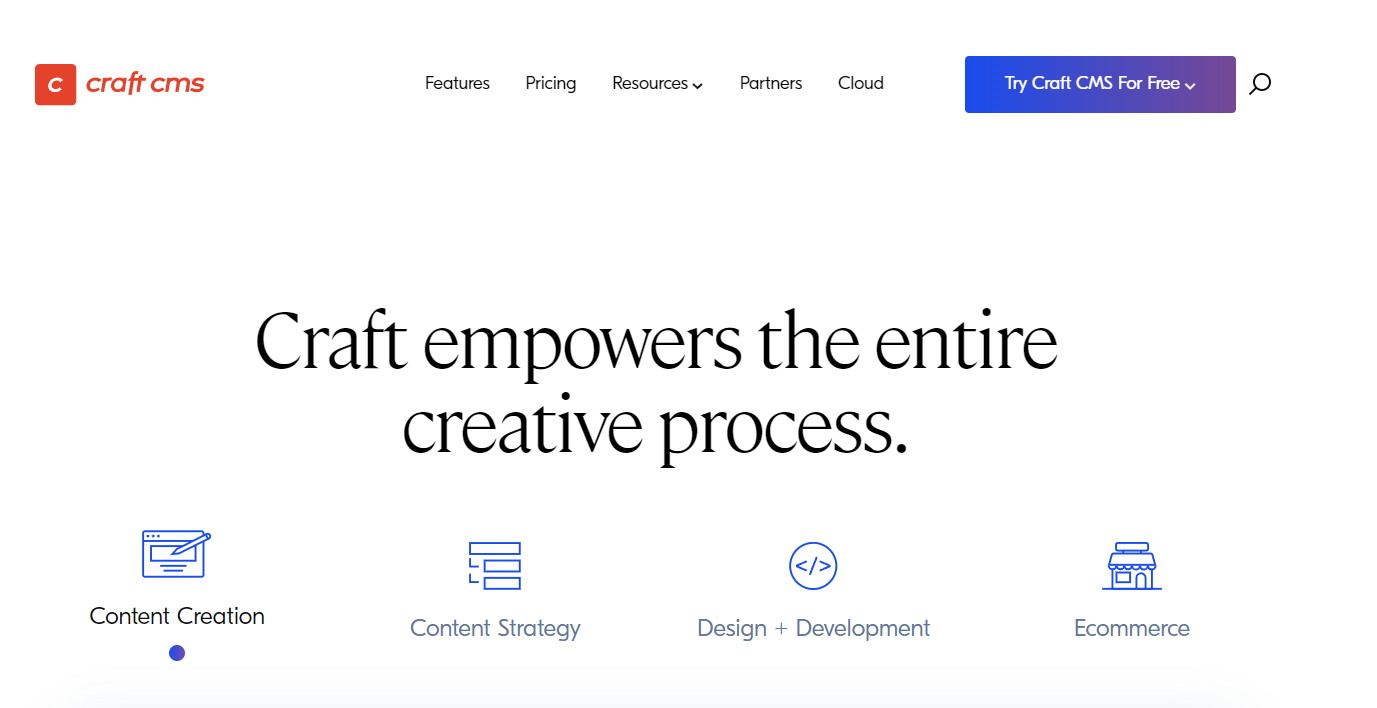
Craft CMS is a premium content management system renowned for its flexibility and content-centric approach. It’s a powerful choice for bloggers who value meticulous control, content customization, and top-notch performance.
Craft CMS provides a great level of control over content structure, making it ideal for bloggers who require a tailored and unique approach to content organization.
With an extensive range of customizable elements and templates, Craft CMS empowers bloggers to create visually appealing and personalized websites.
Additionally, Craft CMS is optimized for performance, ensuring that your blog loads quickly and provides an excellent user experience.
- Highly Customizable
- Content-focused
- Precise control over customization and content
- Premium pricing options may be too much for beginners
- Steep Learning curve
Pricing
Craft CMS offers a free version known as “Craft CMS Solo†with limited features. Pricing for more advanced versions, such as “Craft CMS Pro†that costs per project and goes from $240-$299/month and “Craft CMS Enterprise,†that is typically tailored to your specific needs.
Best for:
- Content creators
- Medium to larger businesses
- Agencies
Best Blogging Platforms for SEO
If you prioritize the SEO performance of your blog and want to improve your website’s visibility, you should consider blogging platforms with strong SEO features. We listed our best picks below.
WordPress Blogging Platform
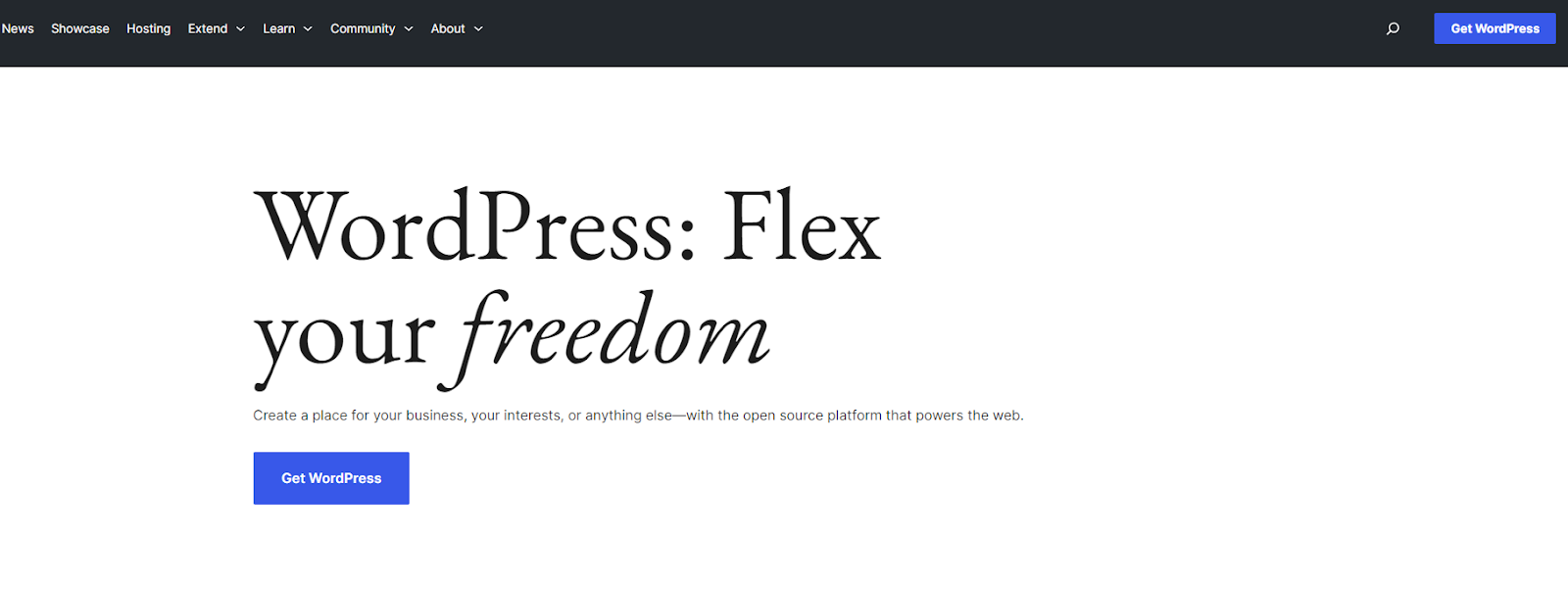
WordPress is one of the most popular and versatile content management systems globally, renowned for its flexibility and extensive plugin ecosystem. It powers a significant portion of the internet, offering a wide array of features for bloggers and website creators.
WordPress blog platform stands out for its user-friendly interface and the ability to create various types of websites, including blogs, with ease.
You can choose from thousands of themes and plugins, allowing for extensive customization and functionality. Its vast community and developer support ensure regular updates and a wealth of resources for bloggers.
- It’s user-friendly and simple to use
- Vast library of themes and plugins make it customizable
- Great community support
- SEO-friendly features
- Great scalability
- Plugin compatibility conflicts
- Security concerns due to its vast popularity
- Advanced customization can be difficult for beginners
Pricing
WordPress software is open-source and free blogging platform, but you’ll need to pay for web hosting and potentially premium themes or plugins, depending on your requirements and preferences.
Best for:
- Both new and experienced bloggers
- Personal blogs
- E-commerce websites
- Small to medium businesses
Learn more about WordPress:
- Best Website Builders for WordPress
- Best WordPress Hosting Services
- Fastest WordPress Hosting Providers
- Is WordPress Free: What is Free and What Will it Cost You?
- 10 Awesome WordPress Search Plugins
- Is WordPress Better Than Coding?
- How to Install WordPress from cPanel
- How to use WordPress: A beginner’s guide to building a WordPress Website
- The Pros and Cons of WordPress: Should You Use It Or Not?
- 23 Ways to Speed Up Your WordPress Site
SquareSpace Blogging Platform
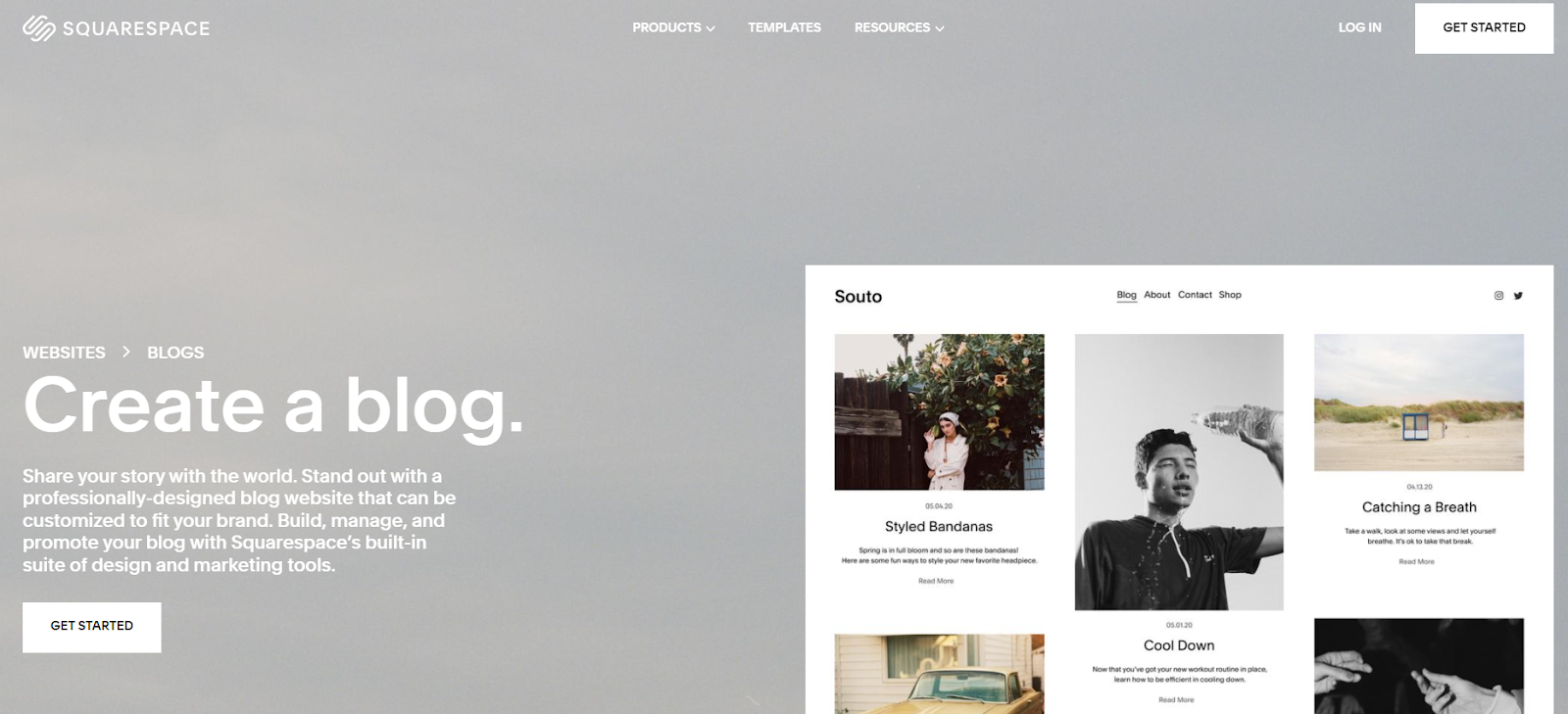
SquareSpace is a popular all-in-one website builder that includes a robust blogging platform. It’s known for its stunning templates and user-friendly design, making it an attractive choice for bloggers looking to create visually appealing websites.
It boasts an extensive library of beautifully designed templates, eliminating the need for extensive design skills which makes it a popular blogging platform.
With its intuitive drag-and-drop editor, bloggers can easily arrange and customize content. The platform prioritizes mobile optimization, ensuring a seamless experience for mobile users.
It includes built-in SEO tools to enhance discoverability and integrates seamlessly with various media sources, enabling the embedding of videos, audio, and images in blog posts.
- Beautiful templates
- Drag-and-drop editor for intuitive use
- Mobile optimization
- Built-in SEO tools
- It’s a bit pricier than other platforms
- Not as flexible as other CMS platforms
Pricing
SquareSpace offers a free trial with no credit card requirement. Its plans start from $16 to $49/month.
Best for:
- Bloggers who want to create an aesthetic blog
- It’s a good option for personal blogs
- Good for small businesses
- Great for portfolio sites
Read the full review: Squarespace review
Medium Blogging Platform
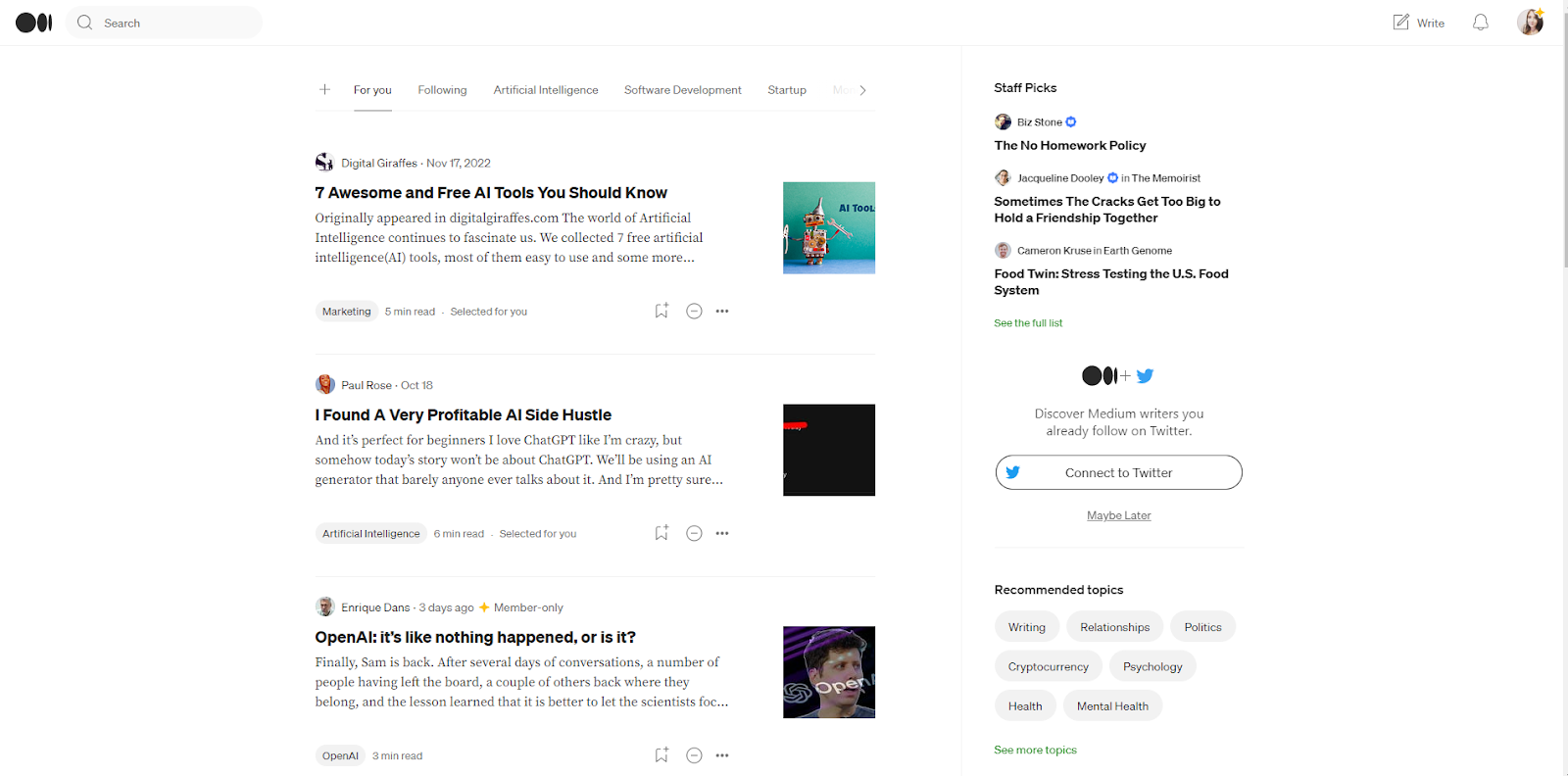
Medium is a minimalist platform that centers around the art of storytelling and content creation. Key features include a simple and clean writing interface that eliminates distractions, allowing writers to focus solely on their content.
Medium boasts a large and engaged user base, providing authors with the opportunity to reach a wide audience. Additionally, it encourages community engagement, allowing readers to highlight, comment on, and share specific parts of posts, promoting interaction and discussion among users.
However, it’s important to note that Medium offers limited customization options for design and may not be the best choice for those seeking highly personalized blogs.
- Simplicity and clean writing interface.
- Access to a large and engaged user base.
- Encourages community engagement and discussion under each blog post
- Limited design customization options.
- Limited monetization compared to other platforms.
Pricing
- Medium offers free access to its platform, but it also has a paid subscription called “Medium Premium†that provides ad-free reading and access to exclusive content for $5 per month or $50 per year.
Best for:
- Writers
- Bloggers
- Developers
- Small businesses
Best Blogging Platforms to Make Money
If your goal is to make money through blogging, you should consider platforms that offer various monetization options and have the potential to attract a substantial audience. Here are some of the best blogging platforms for making money.
Shopify Blogging Platform
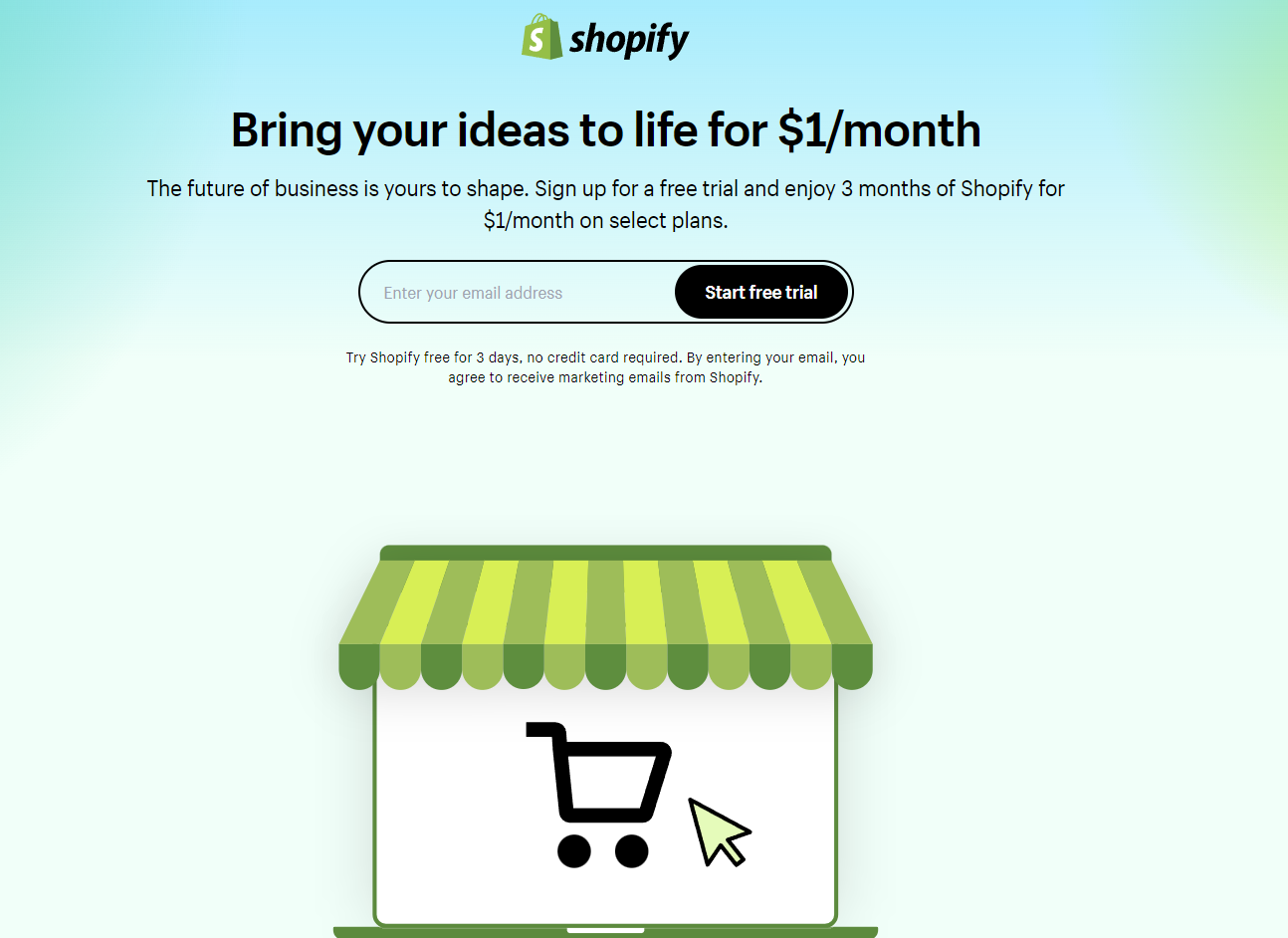
Shopify is a widely-used e-commerce platform that includes a built-in blogging feature. While its primary focus is on online stores, it offers robust blogging capabilities for businesses and individuals looking to integrate content marketing with their e-commerce operations.
Shopify allows you to link your blog posts with products in your e-commerce store, creating opportunities for cross-promotion and boosting sales. Additionally, you can schedule posts in advance and maintain a consistent content calendar. If you have an international audience, Shopify provides multilingual support.
It also has built-in social media sharing features, which make it easy for readers to share your blog content. Also, you can use built-in analytics to track the performance of your blog posts and understand reader behavior. It’s also a self-hosted blogging platform.
- E-commerce integration for a fully functional online store
- Fully customizable
- Great e-commerce tools like inventory management and payment processing
- Strong SEO optimization
- Monthly subscription fee may be too high for small businesses or individuals
- Steep learning curve for those getting into e-commerce
Pricing
Shopify boasts free trial and frequent discounts. But, its pricing plans go from $32-$399/month.
Best for:
- Individuals who want to sell some products
- Small to medium businesses with a product inventory
Learn more in our Shopify guides:
- Shopify Review – Is It The Best For Your Business?
- How to Change Domain Name on Shopify in 5 Easy Steps
- WooCommerce vs. Shopify
- How to Create a Landing Page on Shopify
- Shopify vs. Squarespace
HubPages Blogging Platform

HubPages is a platform that allows writers and bloggers to create content-rich articles on a wide range of topics. It operates on a revenue-sharing model, where writers can earn money through various monetization methods, including ads and affiliate programs.
HubPages provides an intuitive interface for creating articles, while offering an active community interaction. The platform enforces content quality standards to maintain a reputable and trustworthy environment.
- Multiple ways to earn money
- Community engagement
- High quality content guidelines
- Shared revenue. HubPages takes a portion of your earnings
- Limited control due to content quality standards
Pricing
- HubPages is free to join and use. Writers can earn money based on their article’s performance and monetization methods and HubPages will take a fee from the writers’ performance.
Best for:
- Writers and bloggers
Tumblr Blogging Platform

Tumblr is a microblogging platform known for its simplicity and social community. It’s designed for short-form content, making it ideal for sharing thoughts, images, videos, and other media in a quick and engaging way.
Although it’s a microblogging platform, Tumblr offers plenty of features. It has a user-friendly interface, making it easy to create and share content, like text, images, GIFs, videos and audio.
Tumblr boasts a vibrant and engaged user community. It also offers features like reblogging and liking posts to encourage social interaction and content discovery.
Users can personalize their blogs with a variety of customizable themes and templates. This flexibility enables bloggers to create a unique and visually appealing online presence.
- It’s user-friendly
- Community engagement
- Great media versatility
- A variety of themes and templates to consider
- Limited long-form content
- Limited monetization compared to other platforms
Pricing
Tumblr is generally free, but there are some extras that are paid. The fee pricing depends on which country you’re in. You can learn more here.
Best for:
- Small bloggers
Best Blogging Platforms for Beginners
Weebly Blogging Platform

Weebly is a website builder with blogging functionality, making it a versatile platform for bloggers and small businesses. It’s known for its user-friendly drag-and-drop interface and offers various features to create and manage your blog.
Weebly has several great features for bloggers. It’s equipped with a powerful drag-and-drop builder that allows for easy customization, especially if you don’t have coding experience. All Weebly websites are optimized for mobile devices. Weebly also offers built-in SEO tools to help improve your blog’s visibility on search engines and app integration to expand the features and capabilities of your blog.
- It’s user-friendly
- Mobile optimization
- Built-in SEO tools
- App Center for app integration
- Customization is limited compared to other website builders
- Too many pricing tiers may make it confusing for beginners to choose from
Pricing
Weebly offers a free plan that is limited in features, and for more advanced features you can choose from its tiered pricing that goes from $10 to $26 per month.
Best for:
- Small bloggers
- Small businesses
- Writers
Learn more in our comprehensive Weebly review
Jimdo Blogging Platform
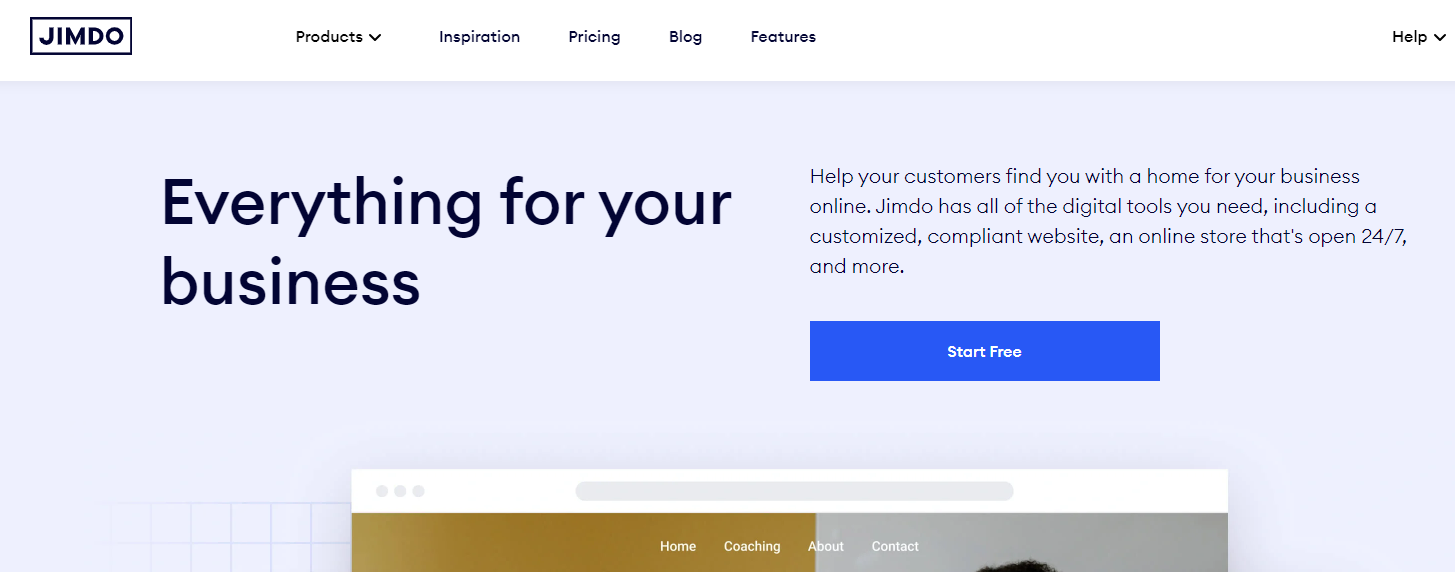
Jimdo is a website builder that enables users to create their own websites without needing advanced technical skills. It’s known for its simplicity and user-friendly interface, making it a popular choice for beginners.
Jimdo is often recommended for small businesses, freelancers, and personal projects due to its ease of use, range of features, and cost-effectiveness. It’s particularly appealing to those who want to create a professional-looking website without the complexities and expenses associated with more advanced website building platforms.
- User-Friendly Interface: Easy drag-and-drop.
- Mobile Optimization: Automatically mobile-ready.
- No Coding Needed: Ideal for beginners.
- Limited Customization: Fewer design options.
- Basic SEO Tools: Limited advanced SEO.
- eCommerce Features: May be basic for some.
Pricing
Jimdo offers a “Start†plan for $9 a month, or a “Grow†plan for $15 a month.
Best for:
- Small businesses
- Freelancers
- Personal projects
Zyro Blogging Platform

Zyro is a website builder and hosting service known for its simplicity and ease of use. It targets individuals and small businesses looking to create websites, online stores, or portfolios without requiring advanced technical skills.
Zyro is often chosen for its user-friendly interface, affordability, and the unique AI tools it offers. However, like many website builders, it may have limitations in terms of customization and advanced features compared to more complex web development options.
- Simple Drag-and-Drop: Easy for beginners.
- Affordable Pricing: Cost-effective plans.
- AI-Powered Tools: Unique AI features.
- Limited Customization: Fewer design choices.
- Basic SEO Tools: Not for advanced SEO.
- eCommerce Limitations: Basic for large stores.
Pricing
Zyro offers several pricing plans ranging from $2.90 a month to $15.90 a month.
Best for:
- Beginners in Website Building
- Small Business Owners
- Freelancers and Creatives
Site 123 Blogging Platform

SITE123 is a web-based platform that provides tools and services for building websites. Known for its user-friendly interface, SITE123 is designed for individuals and small businesses looking to create a website without needing advanced technical skills or web development experience.
SITE123 is often recommended for individuals, small businesses, or beginners who need a simple, no-frills solution for building and hosting a basic website. However, it may not be as suitable for those who require advanced functionalities or extensive customization options.
- Very User-Friendly: Ideal for beginners.
- Multilingual Support: Great for global reach.
- Responsive Design: Automatically mobile-ready.
- Limited Customization: Few design options.
- Basic SEO Tools: Not for advanced SEO.
- eCommerce Limitations: Basic online store features.
Pricing
SITE123 offers a free plan and a premium plan for $5.80 a month.
Best for:
- Beginners in Website Building
- Those Needing Multilingual Sites
- Individuals Needing Quick Solutions
How to Choose the Best Blogging Platform
When selecting the best blogging platform for your needs, several critical factors should guide your decision. Here’s a concise overview of what to consider:
- Purpose: Determine your blog’s intended use, whether it’s personal, business, or e-commerce-focused.
- Monetization: Assess the platform’s support for ads, affiliate marketing, e-commerce, and subscriptions.
- Customization: Consider the level of design flexibility and templates available.
- Cost: Align the platform’s pricing with your budget, accounting for subscription fees and hosting costs.
- Ease of Use: Opt for an intuitive interface, especially if you’re new to blogging.
- SEO Features: Ensure the platform offers SEO tools like customizable meta tags and clean URL structures.
- Integration: Check if it integrates with tools like email marketing and social media platforms.
- Support: Evaluate the quality and responsiveness of customer support.
- Scalability: Choose a platform that can grow with your needs over time.
Final Word
Choosing your platform for blogging can be challenging and time-consuming due to so many features being offered. You can also choose from our list of best website builders along with the best website hosting that will meet your blogging needs.
Next Steps: What Now?
- Learn How to start a blog
- Choose the best hosting for your blog
- Discover the all details about How to start a travel blog
- Explore Best Website Builders for SEO















